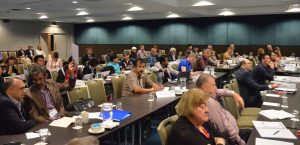2017 World Intellectual Impairment Sport General Assembly agrees changes
 World Intellectual Impairment Sport Member organisations from around the globe met in Brisbane, Australia from April 20-24 for the biennial World Intellectual Impairment Sport Conference and General Assembly. This year’s General Assembly was particularly important as it included elections of Governing Board officers as well as consideration of a number of proposals for changes to governance and strategic priorities.
World Intellectual Impairment Sport Member organisations from around the globe met in Brisbane, Australia from April 20-24 for the biennial World Intellectual Impairment Sport Conference and General Assembly. This year’s General Assembly was particularly important as it included elections of Governing Board officers as well as consideration of a number of proposals for changes to governance and strategic priorities.
A new Governing Board structure, agreed by the Assembly, sees 9 Members At Large elected by the five World Intellectual Impairment Sport Regions. From within these 9, three honorary positions of President, Vice President and Secretary General are then identified. This new structure brings World Intellectual Impairment Sport Regions into the heart of World Intellectual Impairment Sport governance whilst also making them more accountable to the international body.
Marc Truffaut (France) was elected President whilst Robyn Smith (Australia) and Barry Holman (USA) were re-elected as Vice President and Secretary General respectively. These officers are joined by Members At Large Amal Mobadda (Egypt), Emma DeLa Cruz (Mexico), Emma Linnea Bjorndahl (Sweden) and Patrick Chan (Hong Kong) as well as re-elected Members At Large Fausto Pereira (Portugual) and Paul Charnvit (Thailand).
A further three independent positions will now be recruited from outside the membership allowing for key skills and experience to be brought to the Board.
In a seperate proposal, World Intellectual Impairment Sport revised its membership categories and will now permit membership from a much wider range of organisations supporting athletes with an intellectual disability, whilst a new strategic plan sees the organisation trial new eligible categories (for athletes with additional impairments and autism) in addition to the existing intellectual disability category.
Taken together, the changes mark a significant moment for the organisation. A new Board structure brings improved governance, whilst membership changes give a greater number of organisations the opportunity to work with World Intellectual Impairment Sport, and eligibility group changes give a much larger number of people with an intellectual impairment a competitive opportunity in sport.

